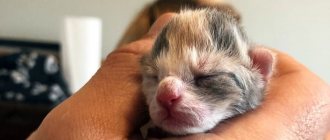The usual life changes if a small fluffy ball appears in the house. Future owners are really looking forward to this day to give their new family member their affection and care. However, before adopting a baby, it is worth considering that the optimal age when you can take a kitten from a cat is 2.5–3 months.
- Skills that a cat passes on to a kitten
- If you pick it up too early
- Gradually separate mother and child
At what age can you buy a kitten and sell kittens: expert advice
Bought a kitten
Often people persistently want to buy a tiny kitten that is barely a month old. Moreover, there is no shortage of advertisements from breeders who want to sell animals at such a young age.
There is an opinion that an older kitten will not form an attachment to its owner. This common misconception is fraught with dire consequences. Read the article on our website about how a kitten develops week by week , and you will understand why it is forbidden to take a little fluffy from its mother.
At what age can you buy a kitten and sell kittens? Experienced veterinarians are categorical on this matter. Here are the experts' advice:
- Don't complicate your life by caring for a kitten whose age has not reached 12 weeks.
- Younger creatures are very small and depend on their mother for everything.
- A three-month-old kitten may seem too old for those who would like to buy a funny little one and watch its development. But for a baby, this is the age when he will feel comfortable in a new place.
- Also, damage to the kitten’s well-being can be caused by tearing it away from its mother until the required time. Parting with a nurse and a familiar environment provokes anxiety and stress in the baby, which immediately affects health.
- In the worst case scenario, the kitten can become seriously ill and even die.
If you still have doubts and want to adopt a baby, then study the advantages of buying grown-up three-month-old kittens:
- Most babies at this age already stop drinking mother's milk and make do with regular solid foods.
- The course of preventive vaccinations prescribed for kittens is behind us, therefore, the immune system is adapted to changes.
- The kitten has mastered the rules of communication with relatives and animals like him.
- Fluffy is ready to meet his new home and is eager to explore the space he will soon find himself in.
Follow the advice of experts and then you will have a new furry friend at home who will be comfortable and safe in the new room.
Why can't you adopt a kitten early?
An early move to a new family can cause disturbances in the physical development of the body and affect the psyche and behavior in the future. Rarely do owners associate this factor with the cat’s habits of scratching wallpaper, furniture, riding on curtains, pooping past the litter box, being reluctant to contact, and accepting petting.
Untimely weaning, coupled with the stressful state of moving, a change in diet leads to diarrhea, provokes pulmonary diseases, weakens the immune defense, making the baby vulnerable to infectious diseases.
Vaccinations for kittens: age, what, first vaccination when?
Vaccinations for kittens
The first year of a kitten’s life is filled with all kinds of medical procedures. These are repeated treatments against helminths (worms), external microbes, fleas and vaccination. Veterinarians convince that vaccination is necessary, because without vaccination the body will not deal with infections, and the animal may get sick.
The first vaccination for a kitten is best done at the age of 8-10 weeks . The second injection should be given after 3-4 weeks . If all vaccines are completed, you only need to worry about getting a booster shot once a year. Here is an approximate calendar of injections, treatments and what vaccinations kittens need to receive:
- 4–6 weeks - first treatment for worms
- 6–8 weeks - second treatment for worms
- 9 weeks - first comprehensive vaccination
- 10–12 weeks - third treatment for worms
- 12–14 weeks - second complex vaccination
How to prepare a cat for vaccinations? Here are the tips:
- The main condition before the vaccine is that the animal must be given an anthelmintic drug one or two weeks before.
- There is a huge selection of them, including in the form of treats that the animal will eat with pleasure.
- Can be used in the form of drops on the fur, which will not provoke any protest and will be well tolerated by the cat.
If these conditions are not met, then after vaccination, the cat may contract an infection, and treatment will cost the owner a tidy sum of money. Look at the detailed calendar of vaccinations and treatments for kittens:
So when is the best time to adopt a kitten?
You can bring a cat child into a new home when he is ready to live without his mother. Here are the signs of his independence:
- He was at least 3 months old.
- He no longer suckles the cat's milk.
- Knows the litter tray and scratching post.
- Licks and washes itself.
- He eats well, is well-fed, and his weight is within normal limits.
- He is not afraid of a person, shows curiosity and interest in him.
- He received his first vaccinations and developed immunity under familiar conditions.
At what age is a kitten considered a kitten?
Little kitten
Cats remain playful into old age, which is why they always look cute like kittens. Often, owners do not understand when their pet will become an adult. Until what age does a kitten remain a kitten?
- Kittens begin to move like adults at two months of age.
- Six-month-old animals enter adolescence. You should be careful at this time.
- Pets exhibit behavioral characteristics with might and main: they mark space, yell, and conquer territory in fights. However, an animal that has reached sexual maturity is still considered a kitten.
- The development of a cat is completed only by one and a half years. Now there is no doubt that the pet has finally matured.
- By this time, animals acquire not only physical, but also social maturity.
However, there is no shame in an adult cat frolicking like a kitten. If a cat remains active and inquisitive in his advanced years, then this is not a reason to doubt his maturity.
Content Features
Raising and maintaining is not an easy task and is very energy-consuming. But if at this age you approach upbringing responsibly, then the baby will not cause trouble at a conscious age.
Features of keeping a baby:
- It is important to monitor the health of the animal from birth. After weaning from the mother, diseases begin to appear.
- You need to start caring for the fur, ears, and claws from the first months of life. This is especially true for owners who dare to have long-haired animals. Instilling a love for such procedures should be done carefully and without aggression or shouting.
- There is no need to bathe him at first - this will become unnecessary stress for him. Getting to know the water can wait about a year.
- It is important to choose the right food. To do this, you need to show the kitten to the veterinarian. He will assess his health, degree of development, and will be able to give advice regarding food.
Kittens
Kitten nutrition
It is in the third month of life that small cats’ teeth begin to change. At this stage it is very important to provide as much solid food as possible. This could even be a special industrial food for kittens.
The selection of food should be done by a veterinarian: he will look at the rate of development, growth, and take into account all possible diseases and allergic reactions. There is no need to purchase budget food. It is important not to forget about natural products: porridge, boiled fish, vegetables.
In the fourth month of life, nutrition may no longer differ from that of an adult.
Kittens eat
It is important to follow the following rules:
- Food should be warm;
- After eating, the bowl must be thoroughly washed immediately;
- If the cat has not finished eating, the leftovers are thrown away rather than left in the bowl;
- Large, coarse pieces need to be chopped to a manageable size.
What to buy for a kitten
A kitten is a small child who demands only the best. Taking on such great responsibility, the owner must be prepared for the arrival of a new family member. It is important that everything necessary is purchased and equipped in advance.
The first thing you need to move to a new home is transportation. You shouldn’t carry a cat home in your arms - this is just additional stress: he has not yet had time to get used to the new owner, and there are still so many strange objects and loud sounds around. It is better to take a carrier immediately for growth. It will also come in handy for upcoming trips to the vet or for flights.
The second most important thing is the tray. The sides of the tray should be low so that the baby can climb over them on his own. It is better to ask the breeder about the filler. Cats, especially small ones, very quickly get used to a certain type of litter (wood, mineral, clumping, etc.). They may get scared of other litter and refuse to go into the litter box. If he still doesn’t fit well in the tray, then you should stock up on oilcloth.
There must be two bowls: for food and water. It is best if there are more of them: for dry food, for natural food, for milk, and so on.
Even if the kitten is very sociable, he will still need his own space. Choose a quiet corner, buy a couch or a soft house. You need to take care of the scratching post; it would be ideal to buy two at once: horizontal and vertical. Well, where would a baby be without toys to play with?
Kitten in a crib
Vaccination
The first vaccination is recommended as early as 8 weeks. At this age, a vaccine is given against panleukopenia, calcivirosis and rhinotracheitis. A rabies vaccination is given at 12 weeks. Kittens are vaccinated twice to ensure that immunity is fully developed.
The timing of vaccinations, including repeated ones, may differ slightly. It all depends on the brand of vaccination and on the recommendations of the veterinarian himself.
There is a widespread belief that if the cat does not go outside, then there is no need to vaccinate it. It's a delusion! All cats need basic vaccinations, but depending on the situation and previous diseases, the list may change.
At what age are kittens measured?
Little kittens
Metrica is an officially issued birth certificate for a pet. This is a kind of identity document, like a passport for people. Only the metric contains other data that indicates its pedigree.
This document states:
- Date, month, year of birth
- Breed name
- Gender of the animal
- Pet name
- Color
- Mother's nicknames for father
- Parents' color
- Breeder's initials
- Owner's initials
- Signature and seal of the organization where the document is issued
To get a metric, the owner needs to contact a cat lovers club in any city. Before filling out the document, kittens are examined for defects. If there are none, the metrics are signed and certified with a seal. A certificate for a pet can be made at an age starting from 45 days .
Luck and protection
According to Russian beliefs, if a person adopts a furry animal, there is nothing wrong with it. On the contrary, both adult animals and kittens are able to have a beneficial effect on the energy in the house, protect owners from possible troubles, improve the well-being of their owners and support them in difficult periods of despair or illness. Of course, before you take a charming tramp into your family, you must definitely get rid of the parasites that are probably bothering him. You need to show your four-legged friend to a veterinarian and get the necessary vaccinations.
At what age are kittens spayed or neutered: recommendations
Neutered kitten
The earliest age to have your pet neutered is 6 months . This is the period of puberty of the animal. The optimal age for castration of a kitten is 7-8 months . Cats grow up to 1 year and it is best to do this when the body is formed, but not completely. It is from 6 to 8 months that this is the right time to castrate or sterilize a kitten.
Worth knowing: It is undesirable to delay castration, since an older animal experiences hormonal changes in the body.
Veterinarians recommend not castrating older animals - from 8 years old , due to the possibility of poor effects of anesthesia.
Conclusion: The ideal time for castration of cats is from 6 months to 8 years.
If you want to pick up an animal
Sometimes the kitten initially does not like the new owner. Then the pet begins to create trouble: damaging furniture and things, biting, scratching. Then the owners will have more serious problems. The animal will knock over dishes with food or drinks onto a person’s clothing, break souvenirs, play with keys, watches, jewelry and other valuable items. In this case, you should find another owner for the kitten or wait until the pet grows up and release it back into the wild.
When meeting a stray animal on the street, you need to stretch out your hands and ask: “Will you come to me?” It is believed that if a four-legged friend approaches a person on its own, it means that the animal has chosen its owner. Before bringing a stray cat into your home, it is better to feed it. When the animal has eaten, it can be taken away.
It is believed that if a stray animal approaches a person on a day that coincides with a church holiday, this means that the pet is a messenger of a guardian angel and is intended to help the owner achieve a certain goal.
At what age do kittens change their teeth, whiskers, and eye color?
A small kitten whose whiskers, teeth and eye color have not yet changed.
Milk teeth erupt in kittens at the age of 2 to 4 weeks.
- Somewhere in the third week, when the baby already has incisors and fangs, baby teeth begin to change to permanent ones.
- This process will be completely completed by 6-7 months .
- Read more in the article at this link , when kittens change their baby teeth, how this process occurs and how to help your baby so that it is less painless.
At what age do kittens change eye color ?
- A newborn baby's eyes do not yet have pigment, and therefore they are blue.
- The change occurs depending on the breed. A cat without a breed will have dark eyes at 1-1.5 months . In an animal with a pedigree, this process can last from 1 to 12 months.
- A cat's eye color finally changes by age 2 .
Vibrissae and tactile hairs are organs of sensitivity, inspection and tactility in a cat, which we call whiskers. They appear in infancy, then grow and change throughout the cat's life, unnoticeable to humans.
Interesting: It often happens that a mother cat gnaws off the whiskers of her children. It is not known why she does this, but the breeders are sure that this is necessary so that the stupid little tomboy does not crawl out of the nest prematurely. It will take six months for the kitten to grow new whiskers.
What to buy for a kitten
You need to prepare for the arrival of a kitten almost as carefully as for the discharge of a newborn from the hospital. Here is a list of necessary purchases:
- Bowls for food and water. There should be three bowls: for dry, wet food and water. If the kitten is on a natural diet, he will still need three bowls for different types of food.
- Tray. At first, the tray and its filler should be exactly the same as in the previous house. Only when the kitten is completely comfortable can you change the tray and filler.
- Scratching post. Sharpening nails will not only help reduce them or remove dead scales, but is also a way to mark territory. Therefore, even with trimmed claws, the cat will “sharpen” them on the scratching post, leaving the smell of the secretion of the interdigital glands.
- Claw cutter. Cats' nails need to be trimmed periodically, especially if they are prone to ingrown nails, growths, or peeling.
- Bed. The cat can sleep wherever he wants, but there must be a house where no one else sleeps and where he can hide.
- Carrying. It is necessary when traveling or visiting a veterinarian.
- Toys will not let the kitten get bored.
The question of what age is best to adopt a kitten is something everyone decides for themselves. Recommendations to take a baby at 3-5 months do not guarantee that there will be no problems with him at all. The deciding factor will be love and education, not the age at which the kitten was taken home.
At what age should kittens be bathed?
The kitten's first bath
In the first weeks of life, the kitten's hygiene is maintained by the cat herself. Therefore, during this period you should refrain from swimming. At what age should kittens be bathed?
- It is best to do this at 3-4 months , after the baby teeth have been replaced.
- This age guarantees that the body will tolerate the procedure well and that mental disorders will not occur.
Of course, you need to perform bath procedures when it is relatively warm in the house and outside. During cold weather it is better not to take risks. Read more in the article at this link , you need to bathe kittens in general, because many owners are sure that this is not necessary.
Worth knowing: You should not bathe kittens with human shampoo - it is best to purchase a special one. It would also be a good idea to check the composition - for children it is better to use a product that has natural ingredients.
Color matters
In ancient times, it was believed that the color of a pet determined how its appearance in the house affected its owners. For example, if a couple has long dreamed of an heir, a white kitten will help them fulfill this secret desire. A cub of this shade, if it is of the same sex as a person, foretells to a young man and girl who are preparing for a wedding that the engagement will be upset. However, if the groom takes home a “boy” and the bride takes home a “girl,” family life will turn out well.
Why French children behave well: eight ways to raise them
Lost weight: what Sofia Tarasova sacrificed for the sake of “VIA Gra” (new photos)
A student at the Vietnam Police Academy shared how she takes care of her facial skin.
Animals with a red color promise material well-being, unexpected and useful acquisitions, and gifts.
Striped and gray pets, according to signs, help housewives find lost objects.
They willingly play with children and make sure that unfriendly people do not appear in the house.
Three-colored pets promise success in any endeavor, support the health of their owners, and cure serious illnesses.
Don't be afraid of black cats.
Such animals protect people from the influence of dark forces and warn of possible danger. For example, when the owner is talking on the phone and the pet does not give him peace, this means that the decision made is incorrect, and it is better to cancel things planned for the near future. In addition, black cats sense places with bad energy and do not allow their owners to approach them.
Rare shot: Viktoria Isakova showed her grown-up daughter from Yuri Moroz (new photo)
If there is little snow, there will be no harvest: December 16 is Ivan the Silent Day
A Brazilian travels 36 km by bike every day to take his loved one home.
At what age are kittens trained to use a litter box or scratching post: recommendations
A kitten is taught to use a scratching post.
Kittens grow quickly and strive to constantly explore the world. At what age are kittens trained to use a litter box? Here is the answer :
- Kittens are trained to use the litter box from 3-4 weeks .
- If the kitten does not understand what needs to be done, you can “interest” him and lightly rustle the litter in the tray.
- As a rule, animals are smart and curious, so the baby will quickly understand what is required of him.
As for the scratching post, here are some tips and recommendations:
- It is also worth accustoming a kitten to it from a very early age, while its desire to explore the world around it is at its peak, and its claws already need a little “polishing.”
- From the age of 1-2 months, kittens are already making attempts to tear at furniture with their still weak claws.
- You can buy a scratching post during this period.
It is important to remember: The process of accustoming to a scratching post is not that simple. Therefore, in some cases, it may take a long time.
Why can't you take your baby away from your mother too early?
There are a number of reasons why cat breeders do not give away kittens before 3 months.
- Little kittens are not yet fully trained by their mother, they do not know how to maintain hygiene and perceive humans.
- Babies are still attached to their mother's breast milk and receive all the necessary elements from it. A sudden switch to another food can be a problem for a kitten.
- Sociality. Kittens that are taken from their mother early often grow up to be aggressive, in some cases fearful, afraid of new sounds or people they have not yet seen.
- Disobedience. Often small kittens refuse to go to the designated place on the tray and damage the furniture with their claws.
- Lack of immunity.
- Stress. For any small cat, changing homes and owners is difficult, and the baby gets enormous stress. However, moving later in life is much easier to cope with. Kittens that were taken from their mother at 3 months are emotionally different from kittens that changed their environment earlier than this period.
There are cases when separation from the mother is inevitable, for example, in the event of the death of a cat. Then the person must choose a nurse cat for the baby, and if this is not possible, he has to raise the kitten on his own, which is a complex process.
Of course, everyone wants to take a baby and raise him on his own from a very early age, watching him grow from a small lump into an adult animal. However, considering the above factors, it is better to wait a little.
Reference!
If you like a certain kitten, agree with its owner in advance, if necessary, pay a deposit or discuss the conditions for keeping the kitten until it reaches the age of 3 months.
At what age can a kitten be treated for fleas: wear a collar, use drops?
Kitten treated for fleas
Fleas prevent the kitten from developing normally. In addition, they carry diseases. Therefore, it is necessary to promptly begin to protect the baby from these pestering insects. At what age can a kitten be treated for fleas? Here is the answer:
- You can treat a kitten against fleas using special drops starting from 1-2 months of age .
- After all, the presence of these insects can cause significant harm to the animal even in infancy.
- Of course, the age of the pet also determines the type of product. For very young kittens, you should choose more natural, gentle products.
- Those drops that are used to treat adult cats will not work.
- You can use sprays or drops on the withers.
- As a rule, at the age of 1-2 months, kittens are treated for fleas even by the most humane owners, who believe that it is not worth “tormenting” the animal until a month.
Worth knowing: If the kitten is less than 4 weeks old and has fleas, they do not use medicines, but folk recipes - as a rule, these are natural decoctions and infusions.
Anti-flea collars are also used to control fleas. But it is worth remembering that they do not serve to eradicate existing parasites, but for prevention. if fleas are already present, then it is better to resort to medication.
Important: Carefully study the composition of the drops and choose those whose recipe contains natural ingredients. After all, the smaller the kitten, the more sensitive its body.
During the treatment, the pet should not experience discomfort from substances with a pungent, unpleasant odor, much less suffocate. Keep an eye on your baby, and if he doesn’t like something or doesn’t feel well, then you need to remove the product as soon as possible.
How to ensure a smooth transition to a new home?
Owners should take care in advance so that when the time comes to separate the kittens from the cat for good, they can be given into new hands without harm to the mother and her cubs. Here are key tips you can follow to ensure a smooth transition for your pet to a new home.
Gradually separate mother and child
It is worth starting the baby’s adaptation to life without a mother gradually. So, after 4 weeks, he is weaned off his mother’s milk, giving him a little complementary food (wet food, low-fat fermented milk products and tender chicken). Also, the woman in labor and her offspring are separated for short periods of time, placing the baby in a nook with its own tray and bowl. A substitute for mother's milk is poured into a bowl and the kitten is taught to lap from there on its own.
Take care of your sad mother
By regularly taking away babies who have achieved basic independence for a while, you will get the mother accustomed to their subsequent absence. This will also affect the amount of milk produced by her body, so that the level of nervous tension of the mother will gradually decrease. Without sensing the smell of a child nearby, his mother will not feel an instinctive urge to find her child.
When the house is empty, the female will begin to feel sad and vocal - at this moment it is important to support her in every possible way: please her with treats and distract her from sadness with games. Gradually she will get used to the new circumstances and return to normal life.
Prepare a feeding area
Decide in advance where your new pet will eat and place separate bowls for food and water in this place. The location of the bowls should be such that nothing interferes with him while eating.
Set up a sleeping area
More than eating, our smaller furry brothers love to sleep. Therefore, it will be better if by the time the baby arrives in the house, he will have already been allocated a special comfortable place to rest and sleep. It is good if the bed is placed so that he can see what is happening around him - curious predators like this.
Choose the right food
The new owner should ask the current owner of the kitten in advance what kind of food he gives him, and make sure that it is suitable for the ward. If everything is in order, you should not immediately switch him to other foods; it is better to do this a little later, when he adapts to the new place. If not, be sure to choose one that is suitable for age, breed and other characteristics.
Place a convenient tray
Choose a tray for your child so that it is convenient for him to get in and out of it. Place it in the most suitable place for this purpose. Also, choose a high-quality litter for the litter box so that your pet can go to the toilet comfortably.
Hang a nail sharpener
Don't forget that your new friend, although small, is still a predator. And even though his claws are not yet as strong and long as those of an adult, they still need to be sharpened regularly. Yes, and the pet will manifest these instincts. So buy and place a scratching post in a suitable place.
At what age do kittens start walking?
The kitten is already starting to walk.
From birth, kittens are absolutely helpless and are not able to move independently. But at what age do kittens begin to walk? Here is the answer:
- 5-10 days after birth, the animal’s sensory abilities increase, and it begins to develop its front legs.
- Closer to the 10th day , the kittens' eyes open, which gives them a sense of orientation in space.
- In the future, babies will continue to develop sensory abilities. Thanks to the organs of touch and hearing, the kitten will achieve the ability to navigate in space, which will contribute to confidently standing on its paws.
- Within two weeks the baby will feel confident and will even try to jump.
From this moment we can assume that the kitten actually began to walk. With practice, the ability to walk will improve, and already 20-25 days after birth, the kitten’s ability to walk will approach the skills of an adult.
Kitten development stages
The first two months after birth, the kitten is very dependent on the mother cat, who teaches him all the basic skills for independent life: feeding, moving, defecating, licking himself and ensuring safety.
A helpless newborn takes all this from his mother, from whom they cannot be separated immediately under any circumstances. Therefore, before taking a kitten into your home, it is better to find out what age it is and whether it still lives with its mother.
Let's look at the main stages of kitten development:
0–1.5 week
Kittens are born blind, cannot keep their balance and move freely, so they spend the first week and a half from birth clinging to their mother and only trying to crawl next to them. At first, babies are not able to empty their bowels on their own, so their mother cat helps them cope with this task.
1.5–3 weeks
During this time, the babies grow quite a lot - they become three times larger and reach 300–400 grams in weight. Kittens begin to see the world around them with their own eyes, which are already opening, but are not yet able to keep focus on objects. The third week ends with teething and the first confident steps.
3–6 weeks
During these twenty days of life, the fluffy ball demonstrates independent orientation and confident movement in space. The kitten continues to grow teeth, the number of which reaches twenty-six. You can start feeding a one-month-old kitten with solid food and gently pick it up for a short while - the cat also needs rest and is unlikely to mind, because the baby has already grown up.
6–12 weeks
The baby continues to grow up and master all the necessary key skills for the transition to a full independent life. The kitten's mouth is now just like an adult's - all its teeth grow, so its nutrition consists almost entirely of solid food. The kitten’s body becomes more developed, stronger and able to withstand vaccination. Therefore, at this time the baby is taken to the veterinarian for the first vaccination.
12 weeks and older
By three months, a kitten has usually reached the peak of its development and is ready to begin adulthood. They develop immunity, develop character, and show curiosity and playfulness. The transition from mother's milk and mixed nutrition to only solid food is completed.
It is at this time that the period begins when kittens can be separated from the cat and given to new owners, where they can live without their mother and her help.
Anti-worming medications for kittens: at what age are kittens dewormed?
Anti-worm medications for kittens
Worms for animals cause many problems with health and well-being. Therefore, they need to be removed in a timely manner, and it is better to do prevention. At what age are kittens dewormed? Answer:
- You can fight helminths as early as three weeks of age.
- However, drugs must be labeled accordingly. If there is no inscription “for kittens” , then this product can only be used at one and a half to two months.
- Kittens should not be wormed often - once every three months will be enough.
The most popular medications for kittens against worms:
- Tablets: Milbemax, Drontal, Prazitel, Dirofen. Despite the fact that the tablet form is more difficult for animals to consume. Veterinarians recommend it, since the tablets contain a higher concentration of active substances. You can crush the tablet and put the powder in the kitten's food or directly in the mouth. But then you need to give it a drink, for example, from a syringe without a needle.
- Suspension : Prasitel, Prazicide, Dirofen and Febtal combo. Convenient form for reception. In liquid form, you can give the product using a special dispenser, which is included in the package, or using the same syringe without a needle.
- Drops : Drontsit, Profender, Stronghold, Prazicide. Used as a preventive measure.
It is important to consider: How often does your kitten go outside (and whether it does), how often does it communicate with other animals. If your pet is always at home and there are no other animals in the apartment, deworming can be done less often.
Food products are also taken into account. In some cases, deworming medication is used more often than once every 3-4 months, if the animal eats offal, raw minced meat, etc. But a kitten can become infected with worms even before birth - from its mother cat. The drug should be chosen according to age and weight. As a rule, most products are available in both an “adult” version and a “children’s” version (for kittens).
Advice: Give preference to natural preparations.
One to two months
A one-month-old kitten remains in many ways just as unprotected as it was a couple of weeks earlier. For example, he still needs breast milk for normal development. Trying to switch a kitten to special dry food or natural products at this age is not yet recommended.
Up to three months, kittens continue to need their mother's presence.
Keeping a one-month-old kitten
In general, kittens from one to two months begin to actively develop and increase in size, they have much better control of their body and are able to independently move around the house. At this time, children can already be taught such important aspects of everyday life as:
- tray;
- scratching post;
- relationships with family members and other animals (if any).
Let's dwell on these aspects for a moment and reveal them in more detail.
Tray training
At the age of one month, the pet already gains control over its natural needs and chooses the appropriate place to send them. It's time to introduce the kitten to such a device as a tray and let the baby understand why it is needed. It is important to understand that the tray must be selected according to the size of the kitten. Toilets for mature cats with high sides will seem like impregnable fortresses to a young cat, then the choice should be made on small trays. The kitten should be able to easily jump into the tray.
One-month-old kittens are already able to learn the rules of using a litter box
It is also recommended to approach the choice of filler responsibly. Kittens tend to taste everything they come across, so you should immediately exclude the following filler options:
- silica gel;
- sand filler;
- clumping filler (from bentonite clay).
Clumping granules, which immediately swell in your pet’s stomach, are a direct threat to his life. Silica gel litter, on the other hand, can get stuck in your kitten's throat and cause suffocation. Therefore, the best choice would be natural wood filler, which will not lead to serious consequences even if it enters the gastrointestinal tract.
Kittens often use litter for other purposes than its intended purpose.
By the way! If the kitten has an increased interest in the litter, you can switch to a tray with a grid, which prevents the animal from direct contact with the materials.
Training to a scratching post
At one month of age, the kitten begins to actively use its claws and teeth. Even though the pet cannot yet cause any significant damage, it is important to channel its energy in a positive direction. The fact is that at this age, kittens show the makings of hunters and they are already beginning to realize their predatory instincts. That is why it is important to set boundaries and priorities in a relationship with your baby in a timely manner and show him what is possible and what is not.
It is most convenient to accustom kittens to scratching posts from childhood.
Usually the cat is engaged in this educational moment, biting the kittens a little in those situations when they go beyond what is permitted. If there is no female at the moment, the owner should take care of the instructions. The optimal solution to this problem would be to redirect the kitten's activity to the scratching post. With it, he will be able to satisfy his need to use his claws with the least damage to others.
There are three main types of scratching posts:
- stationary or wall-mounted;
- floor (in the form of a rug or column);
- built into the gaming complex.
Low scratching posts are good for kittens so they can't fall off.
Floor-mounted and stationary scratching posts are best for kittens. It is better to buy play sets for older pets, since kittens may accidentally fall from them without calculating their strength.
Socialization
If you have small children or animals of any age in the house, it is important to think about the kitten’s safety in advance. It is important for children to clearly explain how they can and cannot play with a kitten, since they can play and accidentally injure the kitten.
The kitten must be introduced to other animals in the house in the presence of the owner.
It is advisable to temporarily keep other pets away from the kitten, since the result of their interaction can be unpredictable, even if the more mature pet was distinguished by its calmness. Of course, completely isolating a kitten is pointless and even harmful for the baby itself. Therefore, meetings with other pets should be arranged only under the control of the owner himself, in order to be able to quickly influence the situation in unforeseen circumstances.
Possible negative consequences
It should be noted that some nurseries practice selling kittens from the age of one month. In some cases, such an early farewell of cubs to their mother passes almost without a trace for them, especially if the owner has enough time to take care of the kitten. But there are also negative consequences, both physiologically and psychologically:
- Month-old kittens separated from their mother's milk may initially suffer from bouts of diarrhea that threaten dehydration. In this way, the baby’s body reacts to a change in environment, a change in diet and inevitable stress;
When switching from mother's milk to other types of feeding, the kitten's stomach often suffers.
- Kittens that have not yet formed “personally” can receive serious psychological trauma if they are separated from their mother early. Subsequently, such animals may exhibit unmotivated attacks of panic or aggression, and it can also be more difficult to teach them any rules.
You can read about the features of feeding one-month-old kittens
Until what age does a cat take care of a kitten: facts
The cat takes care of the kitten
Kittens, like any children, are always very dependent on their mother, but at some point, they still need to become independent. Until what age does a cat take care of a kitten?
- During the time when babies are socializing ( from 1 to 3 weeks ), they develop a sense of family connection. They understand that they need to repeat everything after their mother, but there are also people with whom it is also interesting and fun.
- Also at this time, the role of the cat increases not only as a mother, but as a teacher and mentor.
- Using games and communication, the mother builds the behavior of her children and teaches them to hunt.
In the subsequent stage of socialization, from approximately 3 to 8 weeks , the final formation of self-care skills and the instillation of cleanliness occurs. Although the kittens may seem to be on their own, separating kittens from their mother is not the best option.
Worth knowing: Closer to 12-16 weeks, kittens become much more independent, and the cat stops taking care of them, and this is already a proven fact by many owners of these cute animals.
Why you can’t separate a newborn kitten from its mother
First of all, this can have a bad effect on the health of both mother and baby. At this time, the newborn and his parent are going through (both physically and emotionally) a very stressful period, both instincts are acutely triggered, so separation can have a strong negative effect and become too much stress for them. Such trauma can affect a pet's continued physical and emotional well-being throughout their life.
In addition, a kitten that has just been born is a helpless creature, incapable of independent life. Therefore, until the cat teaches him all the essentials and until his body reaches a certain stage of development, they cannot be separated. If you want your future pet to be healthy and developed, do not take a newborn kitten home, let it grow and get stronger.
Skills that a cat passes on to a kitten
The cat takes care of her cubs from birth and gradually teaches them everything they need for life so that they can cope on their own. Therefore, kittens are separated from the cat at three months of age, when they have learned all of the following:
- The first skills that kittens learn when their eyes open are walking on their four legs and reacting to the appearance of strangers and possible danger.
- Mom teaches not only how to “prick up your ears,” but also how to interact with people, animals and objects. Behavioral skills instilled by a cat mother help the baby adapt to different situations and prepare for further independent existence.
- A cat begins to learn the basics of personal hygiene when her child reaches one month of age. She shows how to properly wash your face, groom yourself thoroughly, and thoroughly brush your fur. The kitten also learns hygiene procedures after eating and going to the toilet.
- The kittens, which are stronger by the month of birth, following their mother’s example, learn to walk around, exploring the territory of the home. Exploring new territories, a necessary skill for any animal, is also passed on from a mother cat to her babies.
- Another important skill for a pet is to go to the toilet in a certain place. Using her personal example, the cat shows the cubs that they need to relieve themselves and empty their intestines in a special tray.
Having learned these lessons from the parent and mastered key skills for adulthood, the kitten is able to move on with its life on its own.
Hurry up, choose a box and find out what gift awaits you
Discount on pet insurance
Promo code copied to clipboard
At what age can a kitten’s claws be trimmed: recommendations
Kitten's nails are trimmed
Long nails are a nuisance to any pet. In addition, they can break, damaging the tip of the paw, and this is already dangerous, since an infection can get inside the body. At what age can a kitten's nails be trimmed? Answer:
- This can be done starting from 4 months . At this time, they are already beginning to interfere with the cat’s ability to run and move actively.
- The formation of claws begins much earlier - from 4-8 weeks of life , and if there is a possibility that the cub may be injured due to the length of its claws, you can begin the procedure much earlier than the deadline.
- At a younger age, kittens' claws are fragile, so they do not cause significant harm, but they can interfere and injure the paws if the animal accidentally gets caught on something.
Of course, you should also pay attention to how quickly the claws grow. After all, some animals' claws grow faster, while others grow slower. It is best to trim once or twice a month.
Important recommendation: When carrying out the first haircut, you should pay attention to accustoming your pet to the procedure, calming it down and encouraging it with treats.
Adult cat
Cats do not always end up with new owners at a young age. There are different situations, among which there are also those when both mature and already elderly animals are looking for a home. In such cases, people often think about the problems that they may encounter when taking into their home an adult, fully formed animal with its own habits and outlook on life. We will talk about such difficulties in this chapter.
Finding a common language with an unfamiliar adult cat is a difficult but doable task.
Let’s make a reservation right away: by adults we mean those cats that have already reached one year of age. So, there are two main scenarios in which an adult cat ends up with new owners:
- the animal was found on the street;
- the animal was taken out of breeding and put up for sale by the breeder at a deep discount.
Stray cats
If the background of a stray cat is unknown to you, and, most likely, it has never lived under the same roof with a person before, then you will probably encounter a number of difficulties in trying to domesticate the animal. It is difficult to accustom mature cats to a litter box, scratching post and other household things that these animals have never dealt with and simply cannot rebuild themselves.
Taming a stray cat requires self-discipline and certain skills from a person
Accustoming such cats to the rules of living at home can take a lot of effort, nerves and time. Therefore, it is recommended to take on such a task only if you already have some experience in raising felines. Also, do not forget that stray cats are more predisposed to aggression in order to protect themselves, so expecting such a pet to immediately settle on your lap and purr is pointless.
Before adopting a stray pet, it is important to undergo a full veterinary examination.
It is also important to remember that a stray cat may have hidden illnesses that need to be identified as soon as possible. Therefore, the first thing you need to do after “adopting” such a cat is to take it to the veterinarian and get all the tests done.
Video - How to tame a stray cat?
Cats from catteries
Cats, of course, leave catteries in disproportionately better condition than those from the streets. However, it is important to keep in mind that not all breeders treat their pets humanely and care about their well-being; therefore, “sold” individuals may later develop various health problems, and, in particular, with reproductive systems. This is especially true for females who may have been used for mating too often in order to produce kittens.
Catteries often sell off mature cats that can no longer participate in breeding work.
In order to take a good mature cat from a cattery, you must first study the history of the breeder you are contacting. It is also recommended to visit his nursery and look at the animals in general.
At what age do kittens open their eyes?
A grown-up kitten with long-open eyes
Not every cat owner knows the characteristics of their pet’s body. Especially beginners cannot even answer such a question as opening the eyes of a kitten. Let's try to clarify the situation.
Experienced owners, based on their expertise, know that kittens open their eyes 7-20 days after birth . It all depends on the characteristics of the cat breed:
- The Sphinxes are considered to be leaders in this matter . There have been cases of these kittens being born with their eyes already open. Basically, on the third day, sphinxes already confidently look into the eyes of everyone around them.
- Next in line are representatives of Siamese, Thai and Siberian breeds . These include the British and Scots . The period of eye opening in such kittens occurs from the fifth to the tenth day.
- In last place are kittens of the Ragdoll . They open their eyes around 21 days after birth.
Worth knowing: Cats do not finally gain sight at the moment they open their eyes. They become fully sighted 5-8 days after they open their eyes.
From birth to one month
Caring for newborn kittens is the most difficult. Such cubs are not yet completely adapted to independent life, and any inaccuracy or mistake on the part of a person can lead to serious negative consequences, including the death of the baby. As a rule, newborn kittens come to a person only if he himself accidentally discovered them or is the owner of an adult cat that gave birth.
Caring for newborn kittens is best left to the “mother” cat.
Cat breeders do not recommend that buyers take pets at such an early age, since there is a high probability that an inexperienced person simply cannot cope with the baby.
Needs of newborn kittens
In the first month of life, kittens especially need support from the mother or her “substitute,” which sometimes turns out to be a person. Among the primary needs that kittens have, it should be noted:
- need for warmth. Being cuddled to its mother, the kitten maintains its optimal body temperature. However, if he finds himself completely alone, he will quickly freeze. Therefore, he will definitely need a box, a towel (or other fabric) and a moderately heated heating pad;
The cat's body allows the kittens cuddled up to it to maintain an optimal temperature
- nutritional needs. It is important for everyone who wants to get a newborn kitten to know that store-bought milk cannot be a substitute for mother's milk. Cow's or goat's milk simply isn't digested properly by kittens and causes stomach upset. Therefore, they can only be fed with special mixtures sold in pet stores;
- need for protection. With mother's milk, the kitten receives substances that help strengthen the newborn's immunity. Of course, this only applies to those cats that themselves have undergone timely vaccination. If the kitten does not have access to such milk, its immunity becomes even weaker. Therefore, it is recommended to interact with such a baby only with previously disinfected hands;
By feeding on mother's milk, kittens maintain their immunity at an acceptable level.
- need for stimulation. Newborn kittens have not yet become full masters of their body and do not know how to use all organs for their intended purpose. For example, they cannot go to the toilet without the help of their mother, who licks their anus, thereby irritating it and causing bowel movements. In the absence of the mother, this task falls on the person, who must periodically carry out this stimulation with a soft, dampened cloth.
Content Features
Kittens that are less than a month old still have poor control of their body, and therefore need constant monitoring. What can we say about coordination, if kittens’ eyes open on average only in the second week of life, and before that they have minimal opportunities to contact the outside world.
Sphynxes' eyes open earlier than other breeds.
By the way! Different breeds have eyes that open at different times. It is believed that in sphinxes this process occurs very quickly, to the point that representatives of the breed can be born with their eyes open. Long-haired breeds usually take longer to “raise their eyelids.”
To prevent the kitten (or kittens) from scattering in different directions, it is advisable to place them in a container, which can be either a wooden box or a strong cardboard box. Warm warming fabrics should be placed at the bottom of the container to make the kittens comfortable. It is important to choose a material that will prevent kittens from getting stuck in it.
It is advisable to keep kittens in boxes or crates that they cannot crawl through.
Temperature conditions
Newborn kittens need a temperature of at least thirty degrees. Then this figure should gradually decrease. By the end of the third week, the cubs feel well even at a temperature of 24 degrees.
The following can be used as a heat source:
- heating pad;
- heater.
To keep the kittens from freezing, the temperature in the box must be maintained using a heating pad.
Using an automatic heater is considered more convenient, since there is no need to constantly check the temperature of the device. The heating pad needs to be updated quite often, since the water cools down quickly.
Important! A kitten box with a heater should be large enough to allow the kittens to move away from the heat source when it gets hot and move closer to it when it gets cold.
Feeding
As already mentioned, trying to feed kittens with store-bought milk is not only useless, but also dangerous. The owner of a newborn kitten has two options - give preference to ready-made substitute mixtures or try to make a similar mixture with your own hands.
Newborn kittens up to one and a half months old, left without a mother, are fed with special mixtures
Among the brands of ready-made breast milk substitutes, the following manufacturers are most popular:
- Beaphar Kitty-Milk;
- Hartz;
- Babycat Milk ROYAL CANIN;
- Katzenmilch;
- Gimpet Cat-Milk.
Table. Daily portions for kittens in the first month
| Age | Portion calculation |
| One week | 30 milliliters per 100 grams of body weight |
| Two weeks | 35 milliliters per 100 grams of body weight |
| Three weeks | 40 milliliters per 100 grams of body weight |
| Four weeks | 50 milliliters per 100 grams of body weight |
There are also “homemade” versions of mixtures, but it is important to consider that not all recipes that will be provided below are suitable for every kitten.
DIY kitten mixtures
Psychological aspect
Early separation from the mother in one way or another leaves an imprint on the kitten’s psyche, affecting all its subsequent behavior. In the first weeks and months of life, it is the “mother” cat who is the optimal role model for her cubs. Thanks to her, they learn to use a tray, sharpen their claws in the right places and react in a certain way to a person.
Kittens that gain independence early may have trust issues in the future.
Kittens growing up side by side with their mother feel protected not only physiologically, but also psychologically. Subsequently, such kittens grow into balanced and calm cats and cats. If a person attempts to adopt a kitten from the street, then he should understand that such a baby may exhibit the following behavioral characteristics:
- excessive caution bordering on cowardice. Inability to establish contact with a person due to fear that a threat may come from him;
- high level of aggression both towards strangers and towards the owner. It often happens that kittens that have not established close contact with their mother cannot establish it with anyone else in adulthood.
It is important to establish emotional contact with a newborn kitten so that it does not grow up in alienation and loneliness.
Of course, this does not always happen. And, if the kitten is “adopted” as a practically newborn, he will be able to quickly get used to the person, seeing protection or support already in him. Here a lot depends on the owner himself, as well as on the degree of his consciousness and willingness to devote a large amount of time to the helpless baby.
Video - Nursing a newborn kitten
Kindness always helps
Of course, compassion for a homeless animal is a good feeling. There is nothing bad or dangerous in wanting to adopt a kitten. You should not give up this aspiration.
After all, having a pet can change your life for the better. A furry friend has a beneficial effect on a person’s physical and mental state. In addition, the pet will always be grateful to its owner for saving it.
Found a violation? Report content
Features of selecting a kitten from the street
A pet requires special care and constant supervision . Before you adopt a kitten from the street, you need to buy some things:
- Bowls for food and water (you need to take care of food in advance)
- Toilet tray (it is advisable to add litter so that getting used to the toilet goes faster and without problems)
- An item for sharpening claws so that furniture and wallpaper remain intact (there are slabs and volumetric figures)
- Toys (kittens are very energetic and need to be played with a lot).
For a sleeping place, you can use a box with a blanket. Many animals prefer to sleep on a bed with their owner.











